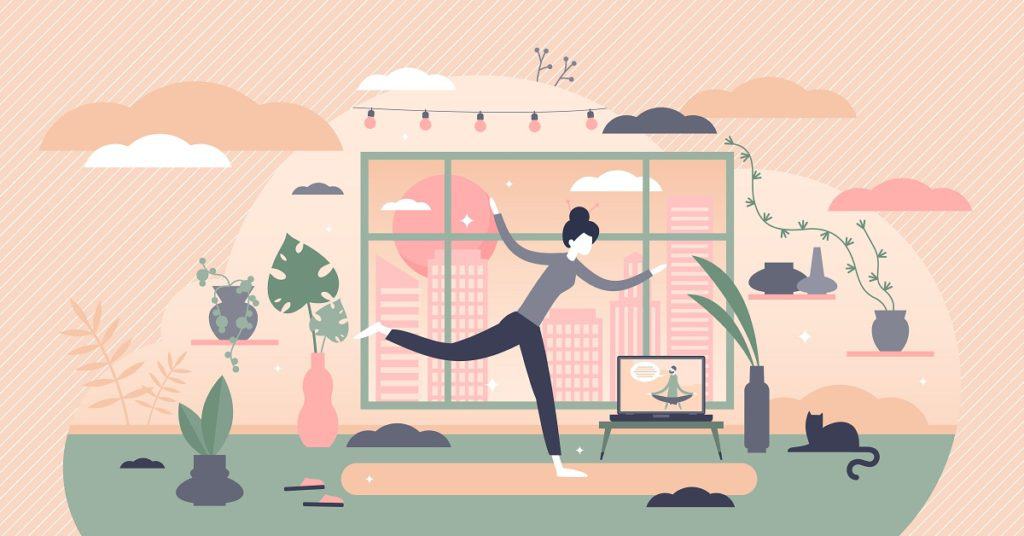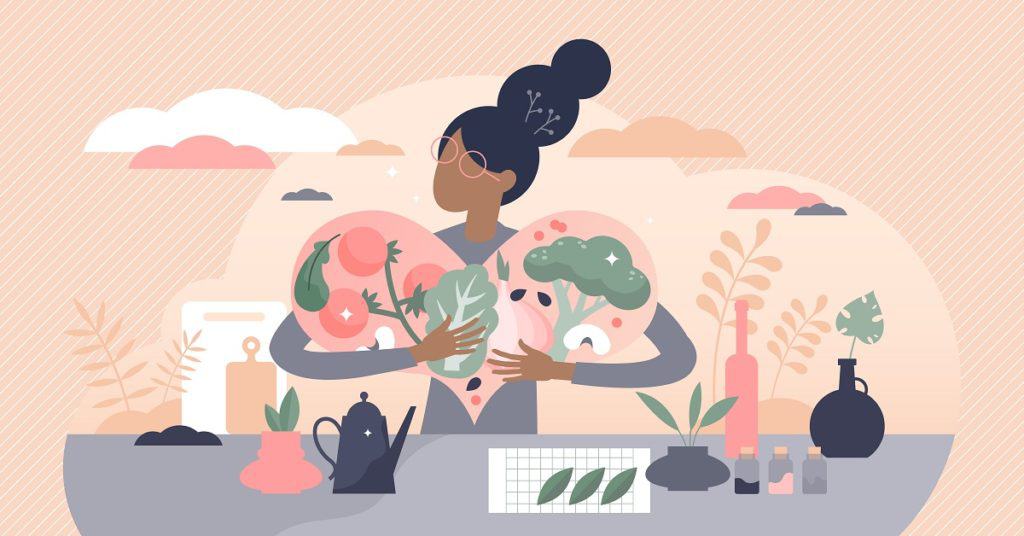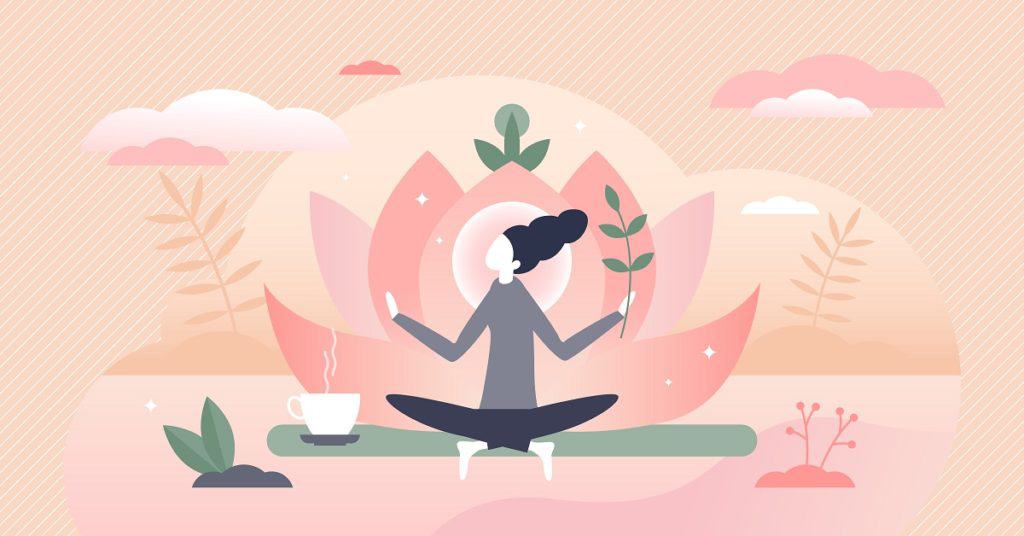The human mind is a complicated beast to tame. 🐲
It’s no wonder so many of us experience low mood, stress, and anxiety.
In this guide, we look at tried and trusted ways you can care for your mental well-being. There are a few techniques here that might just surprise you. Let’s go!
Mental well-being, mental health… What’s the difference?
Mental well-being and mental health are like close friends. 👭
They influence each other, but they’re not one and the same.
Your mental well-being is, broadly speaking, your day-to-day state of mind. That includes your thoughts and feelings, whose overall tone affects how you deal with the ups and downs of life.
Mental health refers to diagnosable conditions like anxiety, depression, schizophrenia, and bipolar disorder. They’re best approached with targeted treatments, like therapy or medication, under the guidance of a medical professional. Whereas your mental well-being is something you can take into your own hands to help you get the most out of life – and that’s we’re focusing on here.
Is this guide right for me?
This guide on caring for your mental well-being is a long read packed with tips to help you bring more positivity and relaxation into your life.
Our approach to mental well-being is based on three main ingredients:
🧠 Harnessing the mind-body connection
🧠 Shifting your perspective (mind hacks)
🧠 Recognising your stressors
In each section, we outline our favourite strategies for cultivating a steadier and stronger sense of well-being. But just like cooking up a soup, you don’t want to throw too much into the pot at once. We recommend picking one or two ideas that you vibe with and seeing how they gel in your life.
We think you’ll find our tips helpful if:
- Worries, doubts, or negative thoughts tend to niggle at you
- Something is missing in your life, but you don’t know what
- You feel out of touch with yourself
- You’ve tried to improve your well-being before, but it didn’t stick
- You want to enjoy life more but are unsure where to start
Everyone who reads this guide is coming from a different starting place. So do what feels right for you, particularly if you have a pre-existing mental health condition. Any tips in this guide should be taken as a supplement to your prescribed treatment and check in with your therapist or doctor first. Now, with the disclaimer out of the way, let’s roll on to the good stuff!
Harnessing the mind-body connection
What does your mind have to do with your body?
A whole lot, it turns out.
Every thought and sensation you have are mediated by your brain cells. There are over 100 billion of them, forming a vast constellation whose connections extend beyond your brain and into your body. This network is so extensive that if all your nerves were all laid out end to end, they’d stretch further than the moon. It’s no surprise, really, that your emotions, the chemistry of your brain, and your nervous system are all intimately connected:
✨ The gut-brain connection. Did you know you have a “second brain”? It’s in your stomach, and your mind and tummy use it to talk to one another. Ever had an upset stomach when you’re nervous or felt sick at a certain memory? That’s the power of the gut-brain connection. It goes both ways, with your emotions influencing your digestive health and your digestive health influencing your mental well-being.
✨ The vagus nerve. Somatic therapy uses physical exercises to work through emotional tension. The vagus nerve has connections to your heart and lungs, and when activated through relaxation, it can slow down your breathing and heart rate.
✨ Emotions and immunity. Chronic stress has been shown to depress your immune system by up to 15%. In turn, inflammation, which is often regulated by your immune system, has links to conditions affecting the brain and mind, like depression and Alzheimer’s disease.
✨ State of mind and posture. Most of us know that emotions can manifest in the body as physical tension, but did you know that the physical posture of the body affects your thought? Studies have shown that sitting up straight makes it easier to think positively, perhaps because we associate slumped positions with defeat.
So, although we might think of our bodies as separate from our thoughts and feelings, they’re not.
People sometimes feel frustrated when they’re at their lowest point with their mental well-being and their doctor suggests exercise or mindful eating. It’s irritating because, although it has truth, it’s not an easy fix. Looking after your physical health should be seen more as creating the ideal conditions to begin fostering your mental well-being, rather than a magic wand.
That’s why we’re making the mind-body connection the diving off point.
Let’s get physical. 🍲 🤸
Help your mood by making moves
Groan – yes, we’re straight in here with the unpopular opinion that physical activity keeps your mental well-being in check.
The thing is, it’s not an opinion. (Though we do agree that it’s a cruel world where a chocolate-based diet is bad for you – but 20 minutes on an exercise bike is good…) Anyway, back to the science.
👩🏽🔬 💬 Regular exercise is consistently associated with lower stress levels, better sleep and improved mental health. It’s been scientifically proven to boost serotonin and kick your endorphins up a notch, which should feel good too.
While we’re not advising you to sign up for the next half marathon (although, you do you), getting out for some fresh air and being active can increase your energy levels, clear your head, and blow off some steam from pent up stress. So, whenever, wherever, however – just get moving.
Swap the wine for water
It might have been impressive when Jesus turned wine into water, but one of the biggest miracles you can do for your mental well-being is to swap it back.
That’s because headaches and beer belly aren’t the only unwanted side effect of drinking. Alcohol is a sedative, which means it can depress your nervous system – leaving you feeling teary, irritable, or anxious, sometimes for days after. If you drink regularly or excessively, you can quickly find yourself out of whack. 😵💫
Most of us know how crappy drinking too much can make you feel the next day, but consistently turning to alcohol to dull the pain of your problems can see them multiplying.
If you need some help getting your drinking under control, there are plenty of resources there to help, including service lines, mobile apps, online chat sites, and recovery programs that aim to help you cut down on alcohol.
Steer clear of self-medicating
Self-medicating is when you try to take care of your emotions or mental health through drugs, alcohol or other substances without guidance from a doctor.
We’re all guilty of self-medicating to some extent.
✋ Hold up five fingers and put one down if you’ve ever taken herbal remedies? Drink coffee or tea to get yourself going? Used over the counter medicine like paracetamols? Had a couple of drinks to calm your nerves on a date? Eaten a tub of ice cream when you’re feeling down?
If you’ve got anything less a high-five left, then you’ve self-medicated. But don’t worry too much – as Paracelsus famously said, “it’s a dose that makes the poison”. The mind-altering substances we casually use, like caffeine, don’t tend to cause much harm.
But other substances – like recreational or pharmaceutical drugs – can play havoc with your mental well-being sooner than you might think. What once helped you or started out fun can spiral into an addiction or dependency that can ruin your mental well-being – or even your life.
Kicking any habits will be fundamental to getting your well-being in balance. If you don’t think you need help, this page will help you think about how self-medicating is really affecting you.
Eat mindfully
It’s not as simple as finding a single solution, but you can reduce mood swings, improve your ability to focus, and feel happier overall just by making a few conscious changes to your diet.
Your brain requires a number of different nutrients to function properly and extensive research has shown that there are “strong links between what we eat and how we feel.”
You don’t need to completely cut out your favourite foods; simply swap out white, processed carbs for whole grain versions, increase your intake of fruit and veg, and cut out anything that makes you feel rubbish after eating it.
Freshen up 🧽🛀
When our mental well-being takes a dip, self-neglect creeps in. At the extreme end of mental health problems, basic self-care like brushing your teeth and washing your hair can be challenging.
But if you’re physically capable, then there are a lot of reasons to start (or end) your day by scrubbing up:
🧽 Feeling fresh boosts your self-esteem
🧽 A hot bath or shower can relax muscles to relieve tension
🧽 You’re less likely to get an illness or infection
It’s a simple thing, but often, the best things in life are.
Try to sleep more
Sleeping well makes for sweet dreams – and a sweeter life too. 😴
If you find yourself waking up on the wrong side of the bed more often than not, you might not be getting enough of it. It sparks irritability and frustration, and you’ll notice you’re overwhelmed more easily than if you were well-rested. Facts known all too well by the many sleep-challenged people who lie awake each night, staring at the ceiling.
Try to stick to a consistent sleep schedule, so that if you find yourself falling asleep during the day (we see you, depression naps), you won’t have as much difficulty drifting off at night. We have another guide dedicated entirely to the pursuit of better sleep, so you can check that out too. But a word to the wise – worrying about sleeping enough can be just as toxic for your mental well-being as not sleeping. So, if you just can’t get those Zzz’s, then fast forward to our tip on creating restful moments instead.
Shifting your perspective (mind hacks)
Do you ever feel like your mind has a mind of its own?
Neuroscientist and meditator Sam Harris describes having an unconditioned human mind (that is to say, a normal mind) as standing on the shore, being constantly buffeted by thoughts, sensations and emotions that appear in endless waves. One after the next, they appear and disappear. We rarely know what our next thought will be.
🌊🌊🌊 🧠
But we can make some adjustments.
Mind hacks are subtle cognitive tricks that, through repetition, can encourage positive thinking and self-awareness. No two skills will stand your mental well-being in better stead than being able to:
- See things as they are
- And yet still see things in the best light possible
The next tips will help you to achieve this by shifting emotions, reframing your thinking, and conditioning your mind to be flexible yet strong. 💪
Embrace uncertainty 🥴
Are you one of those people who like to have life all planned out? Someone who needs all the facts, gets prepared for every situation, and start to stress when life slips out of control?
Even if you’re not the “Monica” of your friendship group, you, like most people, are probably using certainty as a coping strategy. The pandemic has exposed the inherent uncertainty life carries, leaving a lot of people clutching for a sense of control.
It’s normal to fear the unknown. It’s also psychologically unsustainable.
A more realistic outlook on life is to accept how things are right now and to acknowledge that you have no idea how the future will change – for better or worse. Scary, we know — so lean into the fear!
You can embrace uncertainty in your life by:
🍃 Let go of the need to plan everything
🍃 Get more comfortable with saying ‘I don’t know’
🍃 Spend less time worrying about what other people do
🍃 Give up the need to always find the ‘best’ solution
🍃 Leave some parts of life open to chance
🍃 Find opportunities to be spontaneous
🍃 Allow yourself to be ‘wrong’ sometimes
When you do this, you open yourself up to more possibilities, spend less time worrying about the future and more time living in the present.
Get your feelings out 🗣️
Emotions can be complicated and fickle, and trying to wade through the messy thoughts in your head is sometimes a near impossible task. Talking about how you feel out loud is not only cathartic, but it can help you better understand your thoughts and feelings.
Recently, there have been several campaigns working to reduce the stigma around speaking up about struggles with mental health. Men, especially, tend to internalise their feelings and emotions, often due to toxic masculinity and a fear of being ridiculed or thought of as “weak”.
Not convinced? Check out this article from the New York Times on Why Talking About Our Problems Helps So Much (And How to Do It).
Create restful moments 😌
This one is great for anyone who doesn’t get enough sleep or feels stressed. Which, according to the 71.1K retweets of this tweet from Kenyon Laing, is most of us:
“Just to confirm… Everyone feels tired ALL the time no matter how much sleep they get or caffeine they consume?”
… Yup.
Luckily, there’s more than one way to get some rest in life. Emma Beddington from the Guardian has tried all seven types of rest – to varying degrees of success. But even if you’re up to ears in stress, or tossing and turning all night long, there’s a slice of peace to be had.
Take some micro-rest to recharge your batteries:
⚡ Lie down in a cosy room, put on some soothing rain sounds, and let yourself vegetate for five minutes (or more!)
⚡ Remember that vagus nerve we talked about? Learn how to do vagal nerve stretches to dissipate stress and anxiety
⚡ Try progressive muscle relaxation to let go of tension
⚡ Give yourself mental and physical downtime – switch off your all devices and do nothing for a while (this a great time to sit outside) These days, we’re more “switched on” than ever, thanks to our devices following us wherever we go. A digital detox can help you create more space in your life for relaxation (yes, we’ve got a guide for that too!).
Find your people
Unlike most of the mind hacks here, this one is less about you and more about the people you spend time with.
How is that a mind hack?
Self-belief and self-esteem both boost your ability to cope with tough times. And there’s no better thing for your sense of self-worth than being surrounded by people who mirror your values or passions; people who like you – people who you like too. 💏
It can take time to find your people, but there’re heaps of places you can look:
- Think about what you love doing and join a club or go to
events related to it, like arts and crafts or dog walking - Look for online or in-person support groups if you have a mental
or physical health condition - Volunteer in your local community for a cause you care about
- Reddit and discord are websites based on dedicated forums; you can find people who want to chat about almost anything
Not everyone in your life needs to be exactly like you. But if you’re feeling out of place, it’s well worth trying to find a community that helps you feel seen.
Balance self-care and guilty pleasures
Self-care involves a certain amount of discipline – making choices that are better for you in the long run – and there’s no denying that this is good for your mental well-being.
But, broadly speaking, young people today are more health-conscious than ever. We binge drink less, we smoke less, we party less. Research shows we invest more in self-improvement than any other generation. Other than the amount of time we spend online, we’re doing pretty good.
And yet, we’re hard on ourselves. Surveys show we feel guilty about watching TV, eating treat foods, or indulging in some retail therapy. Scientists found that the more guilty we feel, the less restorative benefit we get.
It’s ironic and tragic – because if you’re going to dip on your clean eating plan for some Ben and Jerry’s, or trade in your evening for a Netflix session, then shouldn’t you at least let yourself enjoy it fully?
And isn’t it possible that we occasionally need some low stakes entertainment or dietary hedonism, so our busy brains and hungry tums can chill for once?
Black and white thinking, obsessive behaviour and perfectionism are patterns of thinking that impact our mental well-being negatively. We have a guide to self-care that focuses less on strict rules, and more on using self-awareness to find what feeds your soul.
Pick up a hobby
Making the time to do the things we enjoy is a great way to boost mental well-being, so if you’re experiencing a bit of a dip, it might be worth getting your teeth into a new hobby (or rediscovering an old one).
Check out this article on rejuvenation 101 for some more inspiration when it comes to small, enjoyable activities that can improve your mental well-being. Some of our favourites include:
- Listen to music you love
- Learn to express yourself through song, dance, or art
- Read purely for pleasure
- Pick an active hobby, like walking or rock climbing
- Cathartic writing or storytelling
But any hobby that helps you reconnect with yourself will do!
Respect your limits
One of the very few positive things to come out of the global Covid-19 pandemic that spread throughout the world is that local lockdowns forced people to slow down too.
It doesn’t matter whether your calendar is busy with work or social activities; if you push yourself too hard, you’re more likely to burn yourself out which can take a toll on your health. Saying yes to everything can lead to feelings of resentment or of being taken advantage of. So, make sure you’re checking in with yourself regularly to see if you’re feeling overwhelmed with everything you have on, and try to respect your limits by setting appropriate boundaries.
Hop on the meditation bandwagon 🧘
Meditation and mindfulness – are they just fads?
Let’s see what the science says.
👨🏻🔬 💬 According to recent studies, practising mindfulness lowers stress, rumination and emotional reactivity and boosts your focus and memory. It can take as little as ten minutes a day, so, if that’s not a mental well-being hack then we don’t know what is!
Trendy or not, meditation is a bandwagon worth hopping on.
There are plenty of relaxation techniques that you can use to practice being more mindful. You can follow guided meditation sessions or simply put on some relaxing music and allow yourself to sit with your thoughts. There are some great apps available, like Headspace, with free or paid subscription options, or there’s a variety of videos available for free on YouTube.
Ask for help
Asking for help can sometimes feel like one of the biggest challenges when you’re experiencing a period of low mental well-being. It’s practically an instinct for most of us to respond with “I’m fine, thanks!” whenever someone asks how you are or how you’re doing.
If you want to improve your mental well-being, you need to understand that there’s zero shame in admitting you’re struggling or asking for help. Whether it’s emotional support or literal help with the day-to-day tasks you find too difficult, having help can relieve some of the burden.
Asking for help can also create a deeper connection between you and a trusted friend or family member, which can be beneficial for your mental well-being. Alternatively, you can contact one of the many mental well-being services that have been set up to support you.
Recognising your stressors
If you’re suffering from a cold, you’re unlikely to go and roll in the snow. Similarly, tuning into periods of low mental well-being to identify your stressors can help you recalibrate your life for optimum wellness.
This section focuses more on situations or states of mind that create stress and put a strain on your mental well-being. It’s by no means an extensive list – but it’s a starting point.
Negative people
Misery loves company. Surrounding yourself with negativity is one way to ensure that your own mindset takes a downturn. 🌀
We’re not saying you need to cut out all the complainers in your life – but it’s worth thinking about how the people you’re around make you feel.
Like we mentioned earlier, social media is one of the biggest breeding grounds for negativity. Use it with caution and think about the type of media you consume. Unfollow or block the accounts of people who spread negativity across your feed, and don’t allow people to get under your skin. Although it can be harder in real life when there’s no easy “block” button to press, you should still make the effort to remove negative people.
Shame
Shame is one of the biggest killjoys in life.
We can feel shame about almost anything – our sexuality, our body, our creative output, our socioeconomic status, and even our emotional vulnerability. If we’re experiencing shaky mental well-being, shame is likely following close behind too.
What secret shame do you hold inside that holds you back from embracing your full potential in life? We encourage you to look that shame in the eye – and tell it where to go. Yumi Sakugawa is an artist and Instagrammer who encourages people to heal themselves – creatively and otherwise – by addressing themes like shame, self-belief and self-acceptance. Their work is well worth exploring.
Lack of sleep
A lack of sleep is a one-way ticket to cranky town. But more than that – not getting enough of it can single handedly mess with your mental well-being.
This is because “fundamental neurobiological behaviour is controlled by homeostatic and circadian (24-hour) processes and is vital for normal brain function”.
(Yes, we’re nerdy sometimes 🦉). In human terms, what this means is that without regular sleeping hours, your body clock gets all out of whack and makes it harder to practice the activities or techniques that benefit your mental state.
Feeling overly tired can also lead to irritability which means you’re more likely to lash out at those closest to you and harm your relationships.
Toxic relationships or workplaces
Some people will just bring out the worst in you.
It doesn’t always necessarily make them a bad person, but if you find yourself in a toxic relationship, it’s okay to walk away. In fact, we recommend that you do walk away, for the sake of your mental well-being.
But our feelings about people are rarely black and white, which means it can be hard to figure out what’s toxic to you. Here are some signs to look out for:
⚠️ You feel drained after spending time with them
⚠️ Spending time with them makes you question or doubt yourself
⚠️ You often find yourself compromising – and it isn’t mutual
⚠️ Your self-esteem takes a hit in their company
⚠️ You feel controlled, disrupted or threatened by them
⚠️ You feel anxious or stressed at the thought of being around them
⚠️ Other people have noticed the negative impact of the relationship
Whether they’re romantic relationships, friendships, or workplaces, try to resolve anything in your life that’s toxic or harms your mental well-being, even if this means cutting it out completely.
Self-criticism
Don’t allow your feelings to become facts, because when you’re struggling with mental well-being, the voice inside your head can be the first to turn on you and tell you terrible things.
Whether you’re worried about not being smart enough, or competent enough, attractive enough, successful enough, rich enough, or funny enough – the list goes on – try not to be too hard on yourself, as repeatedly telling yourself this will take its toll and wear you down.
This is particularly true in work situations where you may be putting excessive pressure on yourself to perform to a certain standard. Perfectionism can commonly lead to anxiety, and you may develop unhealthy, excessive work habits that worsen your mental well-being.
So next time you notice negative thoughts or worries, visualise them as a balloon – and simply let them go. 🎈When you don’t give them power, you’d be surprised how quickly they can drift away.
Comparing yourself to others
With the rise of social media, it’s too easy to check up on old friends, family, or even acquaintances who are seemingly doing so much better at life than you. If you notice yourself doing this more, take some time away from your screens and socials. The results of a study published in Preventive Medicine shows how this can benefit your mental well-being, as reduced screen time was associated with “higher levels of satisfaction and optimism, and lower levels of anxiety and depressive symptoms” in the participants.
Despite a lot of mainstream media portraying perfectionism as a quirky character trait that highlights a person’s hardworking nature, it is actually a huge cause of stress and anxiety.
It can worsen your mental health in a number of ways, but one of the biggest risks posed by the desire to be perfect at all times is turning to self-harm. This is a rising concern as cases of “cutting” increase amongst children and young teens, who are particularly at risk due to the pressures of school exams and college applications they have to contend with.
However, perfectionism and its consequences to your health are not limited to the young, and can carry on well into adulthood where it can affect how you live your day-to-day life.
Final words of encouragement
Taking care of your mental well-being should be a top priority, and we hope that this article has provided some valuable information that you can take away and apply to your own life to look after yourself and your mental well-being.
If you feel like you’re struggling to take care of your mental well-being or if you feel like you are a potential danger to yourself, please reach out to a trusted friend or family member or, alternatively, reach out to one of the mental well-being services available and seek help or advice from the trained professionals who are waiting at the other end of a phone call.
Remember that things can always get better. If you start to put more effort into the practices known to benefit your mental well-being, a positive shift will come your way.








